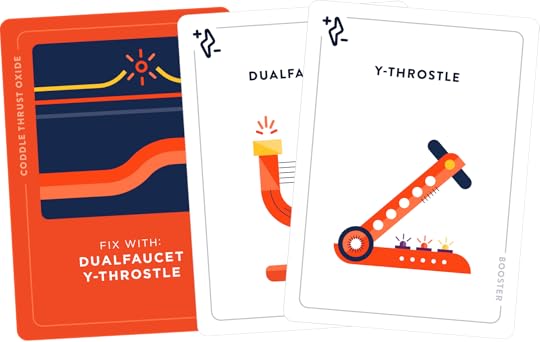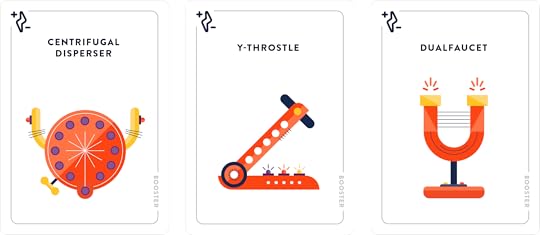Kill Screen Magazine's Blog, page 221
September 25, 2015
Learning to cope with pain with Metal Gear Solid
Hideo Kojima’s games can be brutal. For some, that’s the point.
September 24, 2015
Calling all international writers: we want to work with you
Let's explore the world of gaming together.
Oculus gets touchy-feely, shows off motion controls
The lead virtual reality company gets in touch with interactive
entertainment.
Magic Flute reimagines the famous opera as an urban puzzle adventure
I can name few games based on renowned European operas, and even fewer based on famous Japanese adaptations of classic European operas. In fact, only Magic Flute fits the bill. Created by LabLike, Magic Flute is a tile-based puzzle game for iOS set in the world of Wolfgang Amadeus Mozart’s The Magic Flute—as performed on-stage in a rendition created by the acclaimed Japanese stage director Amon Miyamoto.
Miyamoto reimagines Mozart’s fantastical musical adventure as an urban tale, using moody city sets combined with grand, classical architecture to create a mystical mash-up of worlds. The actual opera itself uses video projections to generate scenes and sets that border on the surreal.
This cross-genre style also manifests in Magic Flute, the game, which pulls directly from Miyamoto’s visuals and uses its freedom as a game to bring some of Miyamoto’s own dramatic liberties to life, including the giant white serpent that stalks the protagonist. Parts of the game even take place backstage, which is just as perilous as the hero Tamino’s adventure in the story itself.
Magic Flute came out on the App Store today. Find out more on its website.
What the hell is Broken Reality?
What the hell have I gotten myself into for you people? Is there a virus on my computer? I feel like there should be a virus on my computer.
All I wanted to do was write a story about videogames when I found myself on the Tumblr for a game called Broken Reality. Of course, aside from “game” being in the URL, I wouldn’t have known that's what it was. All I saw before my eyes was a collection of neon kitsch framed within what looked like a desktop running Windows 95. Bewildered, I decided to check the “About” section, where I found lorem ipsum, latin gibberish commonly used as placeholder text in graphic design. Perfect. I then noticed a pop-up on the side that encouraged me to like the game’s Facebook page, which was suspiciously modern for a site that looks like it was built by my mom, even if the pop-up also featured an out of place flashing animated graphic of a tropical island.
I feel like there should be a virus on my computer
The Facebook page, though, contained my answer: “Broken ������������������ (Broken Reality) Is a First Person Narrative Driven Virtual Reality Exploration Video Game Currently in Development.” Aha! So this IS a videogame! The Facebook page contains more tongue-in-cheek clip art and knowing kitsch which almost reminded me of the Arcane Kids’ school of parody.
[image error]
I wasn't yet sure if I could write about this thing, so I decided to let it wait a few days and check back later. Today on the site, I found a link to a newly posted trailer. Well, newly posted to the website, at least. The trailer itself has been up on YouTube since October of 2014. Still, maybe I could finally learn what, aside from a sense of irony, this thing was about. The trailer features an unseen user logging into Natem, an operating system which recalls '80s visions of VR, as a voice proclaims the OS to be the "most advanced operating system of the 21st century" and beckons the user to enjoy the “virtual network where you can enjoy your time doing your daily chores in a beautiful environment ... without any harm.”
daily chores in a beautiful environment...without any harm
This is about as far as I’ve been able to crack the game’s wall of too-cool-for-school mystery, but the screenshots uploaded so far, along with the premise described on the Facebook page and in the trailer, make it out to be a sort of combination of Myst, 1984, and late ‘80s/early ‘90s web design.
You can keep up to date with Broken Reality on its Tumblr. Meanwhile, I’m going to make sure my copy of Avast is up to date.
Movable Play continues October 6th
Join us October 6th for more talks from the creators of great mobile games.
The 9/11 virtual reality experience that nobody has been waiting for
Really?
Allison Road aims to engorge its chilling sights and sounds with your help
In a genre dominated by Slender clones and zombie-infested action game hybrids, P.T. filled a void in many horror fans’ hearts; a small, but twisted taste of what the larger Silent Hills project would be, it succeeded as its own, compact experience and also gave folks something to look forward to. So when Konami cancelled Silent Hills and removed P.T. from the PlayStation Store, where was there to turn? A little house on a quiet street in Manchester.
It began as a spiritual successor to P.T., but the more details that surface about the upcoming Allison Road, the more it begins to feel like its own distinct experience. Now there’s a Kickstarter for the project, asking for a little over $388k USD. It’s already made a large portion of that, with 28 days still left to go.
The Kickstarter campaign brings plenty of new details about Allison Road to light, namely its setting. It was known before that its already iconic home is a British town house, but now it’s revealed that the house is set specifically in Manchester, and that it won’t be the only location in the game.
A place called Magga is also teased—a rickety wooden cabin set at the top of a narrowly columnar cliff, shrouded in the darkness of a solar eclipse. Down the front of the snow-crested cliffside, a ladder descends into the shadows below.
a tense audio/visual horror experience
Sample songs from Allison Road's Kickstarter reveal slow, wailing piano tracks reminiscent of The Chinese Room’s emotional soundscapes or the safe room themes of classic survival horror games, but there's also a sample of one of its creepier tracks—dark, abrasive industrial seemingly influenced by Silent Hill’s own Akira Yamaoka. Lilith, the studio behind Allison Road, have said again and again that their game is meant as a “tense audio/visual horror experience,” making its sounds just as important as its gruesome sights.
To give those interested in Allison Road some hands-on time with the game, Lilith plans to release a PC-only demo called The Lucid Dream sometime next year. It’ll be a standalone experience separate from the main game, but set in the same universe.
For more on Allison Road, head over to its Kickstarter page.
SOMA finds the horror inherent in glitch art
The hell of malfunctioning machinery in SOMA
Turning Spaceteam into a card game that doesn't suck
It's hard for me to imagine Spaceteam as a card game. My burning memory of it is playing it over a table of half-eaten sushi somewhere in France. A bunch of us were sat around in a square, smartphones trembling in our hands, frantically shouting at each other as loud as hungry ravens. How any of us understood a word of it I don't know.
The thing is, Spaceteam is so suited to being played on a smartphone that divorcing it from that platform seems futile. What works about it specifically is the urgency that the game forces upon you. As it's digital, the seconds are counted independently by the game, so everyone can focus on trying to fix a constantly malfunctioning spaceship. It also takes advantage of the smartphone's mobility and ubiquity, meaning that there are potential players all around you who can join in with ease—people can walk into the room, sit down, and begin playing without any hassle.
I can see how this might work.
Despite whatever resistance exists, a team has developed Spaceteam as a card game, one that they hope captures the spirit of the original. The idea is the exact same: all members of your crew have to ensure the ship systems are functioning properly in order to escape an impending black hole. The difference is that, instead of holding a smartphone in their hands, each player has some cards. These cards are tools that can be used to repair different parts of the ship.

Players are assigned a sector and once the game starts they then have to react to the cards pulled from the Malfunction Deck in front of them. The usual uproar of panicked shouting should then commence as each player tries to find the tool card they need from other players to fix whatever has gone wrong in their particular sector. There are no turns to take here, instead everyone plays at the same time, frantically fighting against a timer. Victory is achieved if enough malfunctions are corrected to reveal the six hidden System cards before time is up.
Having this explained to me a week ago by one of the creators, Matthew Sisson, has turned my view around. I can see how this might work. Spaceteam as a card game could be possible. And so I spoke to Sisson further to find out precisely how he and the rest of the team went about translating the game from digital to physical, and the challenges this presented.
How did the decision to turn Spaceteam into a card game come about?
We've always been into games, and we've been creating games as more of a side project for quite some time, until we got into escape rooms. Escape rooms are basically fully-immersed games that take place inside of a locked room, but the big limiting factor is that people need to come to you to experience this type of game. So we wanted to move towards the retail game space in a big way, and we wanted to do something totally different that wasn't like any existing card games. One day we were playing the Spaceteam mobile game, and we just started thinking, this would be cool to turn into a board game (we initially planned on a board game, but during development realized the card game would be simpler for players to learn such a hectic-style game). Matt randomly reached out to Henry [Smith, the creator of Spaceteam] and asked him if he would be interested, and to our surprise, he said yes. And, thus the Spaceteam Card Game was born.

The original Spaceteam had a great sense of urgency. How did you translate this to a card game?
We found that real-time games are more difficult to create that we had at first anticipated, but working with Henry and Elan Lee (of Exploding Kittens) really helped us to figure out how to translate the existing urgency into a card game. (Our experience in creating escape rooms also really helped.) We experimented with a lot of different options before we ultimately concluded that: 'we NEED to use a timer' and 'we must force communication/shouting' (i.e. we experimented with a version where all players tool cards were laid out, but ultimately decided against this to force more communication/shouting). Without the timer, it really depended on the overall personality of the group, and was really difficult to avoid strategist-type players from slowing the game down in order to achieve the most effective plays. We found that the timer was the only way to ensure that all players would get on board with the extreme urgency required to induce accelerated heart rates, and ultimately excited shouting.
We also want to move right into expansions for this game
What were you trying to achieve with the card game's artwork? Did you use anything as reference material for the art style?
For every project we take on, we establish a persona and setting, and really try to step into that fantasy. In this case, we wanted to recognize that spaceships require extreme precision but this particular spaceship is not a great example of that precision, it's barely staying together; it is a clunky, half run-down spaceship. Overall, we wanted to have a clean, funky, hard-to-describe but easy-to-look-at cards, and tried to use a color palette reminiscent of the 8-bit theme used for the original Spaceteam mobile game, but with a modern spin.

How much money are you hoping to raise with the Kickstarter and what will it be put towards if successful?
Our goal will be $10,000, which is the amount we need to make a small production run, but we're obviously hoping for more; the sky is the limit. We're still sorting out our stretch goals, but some things we are exploring are upgrading from a standard sand timer to a totally awesome (not going to ruin the surprise if we get there) timer. We also want to move right into expansions for this game; we'll be including the first expansion (a Not Suitable for Space version), which we wouldn't be able to do if we didn't put this on Kickstarter.
Kill Screen Magazine's Blog
- Kill Screen Magazine's profile
- 4 followers



